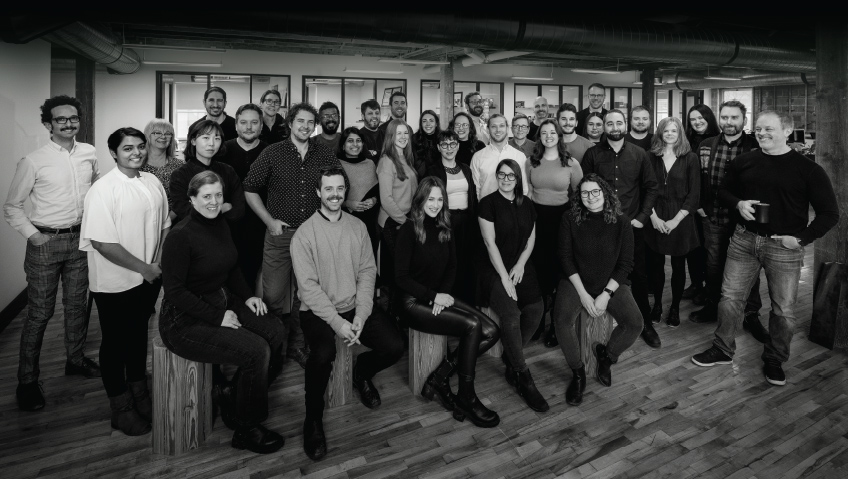Fathom Studio in Dartmouth, Nova Scotia represents the coming together of two initially separate ventures: Ekistics Planning & Design and Form:Media. Director of Planning and Founder, Rob LeBlanc, created both businesses in the mid-1990s. Ekistics served as an urban planning and landscape architecture firm, and Form as an interpretive planning, wayfinding, and graphic design agency. In 2014, Ekistics added architecture to its services under the leadership of Chris Crawford, and in 2019, LeBlanc merged the companies to create Fathom Studio. Soon after, Crawford, and Director of Landscape Architecture, Devin Segal, joined as partners, and together grew the firm from around 20 to over 45 professionals today.
When LeBlanc began in the planning and landscape architecture field himself, most of his work was with international clients in areas like Asia, Africa, and Australia. Since then, such work has begun to flourish in and around Atlantic Canada, especially over the past 15 years. LeBlanc and company, as Nova Scotians, find this to be a meaningful shift. He says that it feels good to see one’s home change for the better and to see the growing interest in good design, innovative placemaking, and community building.
The union of the original companies allowed connecting the design disciplines of landscape architecture, planning, and experiential graphic design. This meant that the company could approach its projects in an interdisciplinary manner. Although specialty work can be done individually, most projects involve all the disciplines working together, to great effect. The firm’s fully integrated structure allows architects to work side by side with landscape architects, artists, urban planners, engineers, interpretive designers, archaeologists, writers, researchers, and graphic designers, and together, the team is able to “shape space, tell stories, and foster community identity in the built environment.”
Director of Marketing and Business Development, Nicole Babineau, says that the collaborative approach championed by Fathom can also be seen in the industries in which it works, especially as more operators begin to realize that working together on projects holistically is more fruitful and can lead to faster, better results. As a result, the team frequently works in joint ventures and strategic partnerships with other consulting firms, architects, and planners to execute bigger projects in the field.
For example, Director of Landscape Architecture Segal describes working with firms like Moriyama Teshima Architects of Toronto, often doing significant projects in collaboration. Fathom has also become the first point of contact for firms beginning work in Atlantic Canada and establishing ongoing relationships there. Its history of building trusted relationships with organizations like Parks Canada, Halifax Regional Municipality, Cape Breton Regional Municipality, and the Town of Wolfville in the Annapolis Valley has led to further projects and alliances over the years.
Funding from partner organizations like the Atlantic Canada Opportunities Agency (ACOA) makes a lot of the company’s work in smaller communities possible. At all times, Fathom seeks to develop relationships with the towns and communities in which it works, leading to greater trust and understanding and to results that truly serve the needs of the community. Fathom’s work is mindful and purposeful, always well-suited to the culture, heritage, and natural surroundings. As the company describes, “Our passion is public space and creating meaningful built environments that inform, engage, and inspire.”
To this end, the company boasts a large portfolio of meaningful projects completed over its 26-year history. To date, its largest project, architecturally speaking, has been the Mi’kmaw Native Friendship Centre in downtown Halifax, which Director of Architecture Crawford says has been an exciting project for everyone. Fathom has in fact been engaged for numerous projects in Nova Scotia’s capital city, including the Argyle and Grafton streetscape downtown and the concept design of Cogswell Transformed, one of the largest urban redevelopment initiatives in Atlantic Canada.
For its efforts, Fathom has received much recognition in its field, including, most recently, the 2023 Royal Architecture Institute of Canada’s Emerging Architectural Practice award. With a breadth of unique projects and the recognition of its field in equal measure, the company is presently in an exciting time, and Crawford says that it has never been busier. The planning side is very active as all levels aim to address the housing shortage and provide hospitals, universities, and other related pieces that must accompany housing. Currently, the team is working on around 60,000 units and master-planned communities across the Atlantic provinces.
To be sure, Fathom has a number of exciting projects underway moving into 2024, including a great deal of investment into more public, community-based projects. The team is learning which projects it loves to do and which have the most potential for to make a transformative impact. Shifts are occurring in multiple industries around topics like net-zero energy, accessibility, and green/renewable infrastructure and materials, so there is a lot of learning still to be done. Fathom will continue to refine its practices while working with communities and groups who appreciate a mindful and collaborative approach, which is where its passion lies.
Now at nearly 50 staff members, the team is finally at a scale where it can begin to pursue larger cultural projects and work on a national scale. “We believe all the pieces we put together under an interdisciplinary lens are our strength as a firm,” says Babineau.
Fathom’s holistic approach is rooted in community engagement because when one spends time learning about the history and culture of a community and spending time with its people, those efforts contribute to every aspect of a project. Projects that involve making local greenery spaces more beautiful and helping locations bring new visions to life are what Crawford considers both dream projects and a huge honour.
“It’s a wonderful time to be working here,” he says of the region. His eagerness mirrors that of his colleagues at Fathom, all of whom are pleased to be bringing the best of all the company’s disciplines together to make Atlantic Canada even greater.






